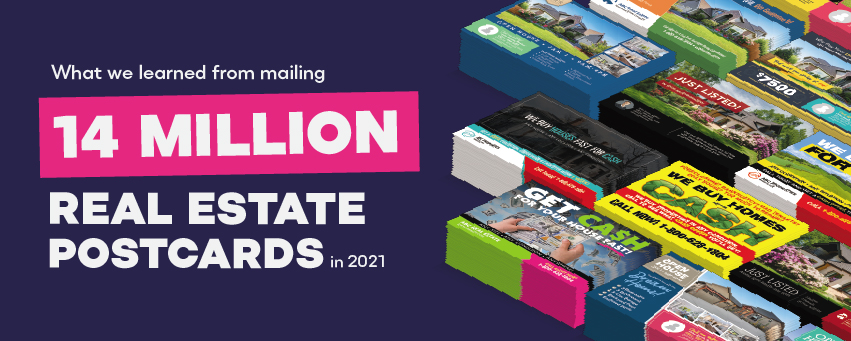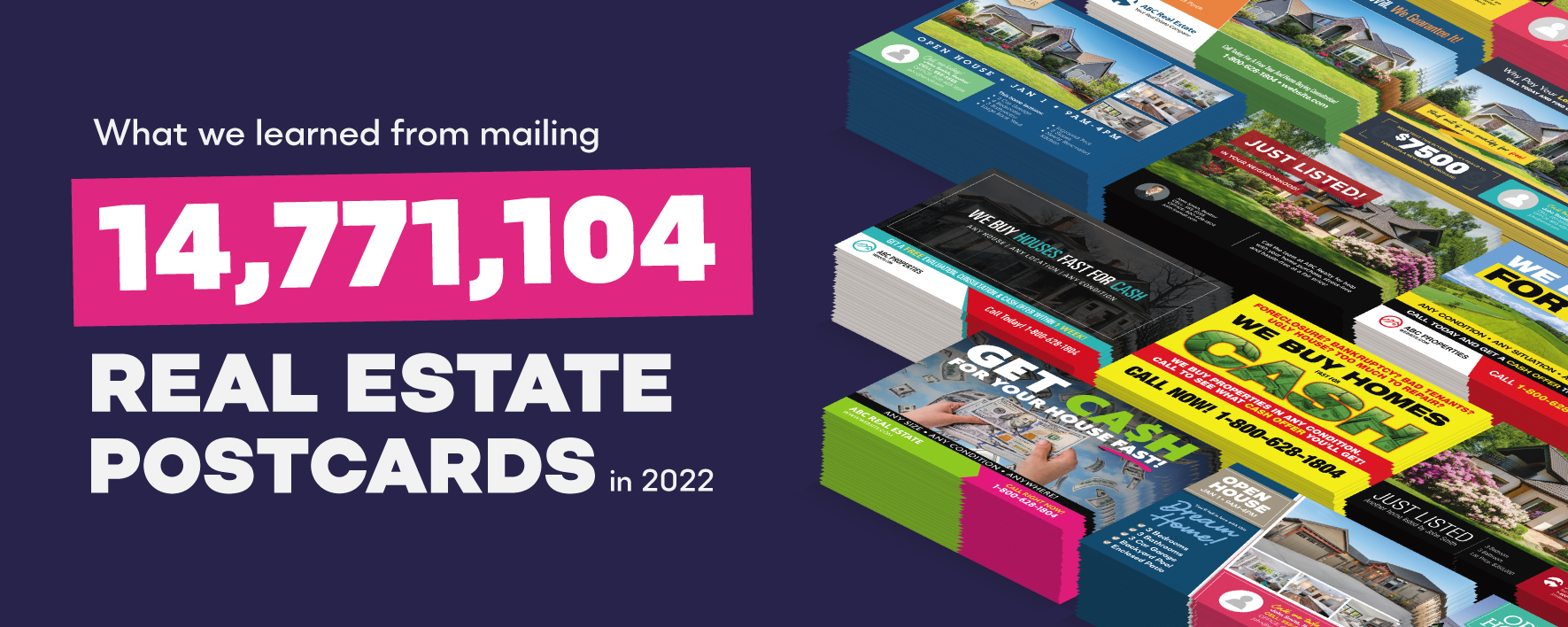What We Learned from Mailing Over 14 Million Real Estate Postcards in 2021
Updated on December 11, 2023According to the Association of Real Estate License Officials, there are currently over 3 million real estate agents in the United States.
That’s a lot of competition — and it’s becoming even more competitive as available housing decreased 66% between 2020 and 2022 (Pacaso).
Savvy agents and brokers know they need a tight marketing plan to gain those precious few listings and remain relevant in their chosen market… and the savviest know that direct mail is an integral part of that marketing plan.
To help you get an edge on the competition, we pulled together information about every mailing we did for real estate agents and brokers in 2021 — amounting to over 14 million mail pieces across 23,000+ mailings — then organized the data to reveal the biggest trends and strategies.
Our research spanned the nation and we even included a state-by-state breakdown as well to help you make more informed decisions about marketing in your specific area.
Here’s what we found…
A snapshot of every PostcardMania 2021 real estate mailing
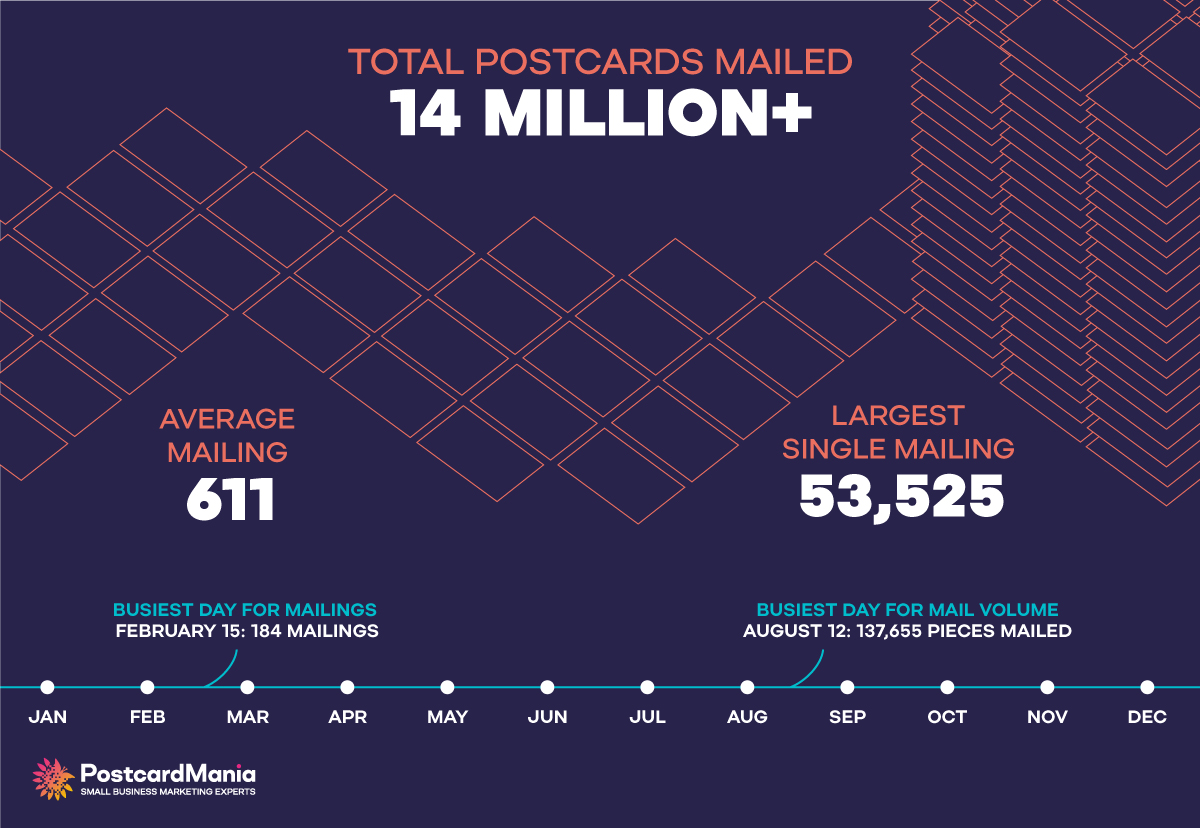
- Total postcards mailed: over 14 million
- Average mailing quantity: 611
- Largest single mailing quantity: 53,525
- The busiest date of the year for mailings was February 15: 184 mailings
- The most mail pieces were sent out on August 12th: 137,655 mail pieces
At PostcardMania, we service more than 13,000 real estate agents and brokers.
But of course, that’s just the top-level, 35,000-foot view.
Let’s take a deeper dive into the data.
Smaller quantity mailings rule real estate direct mail marketing
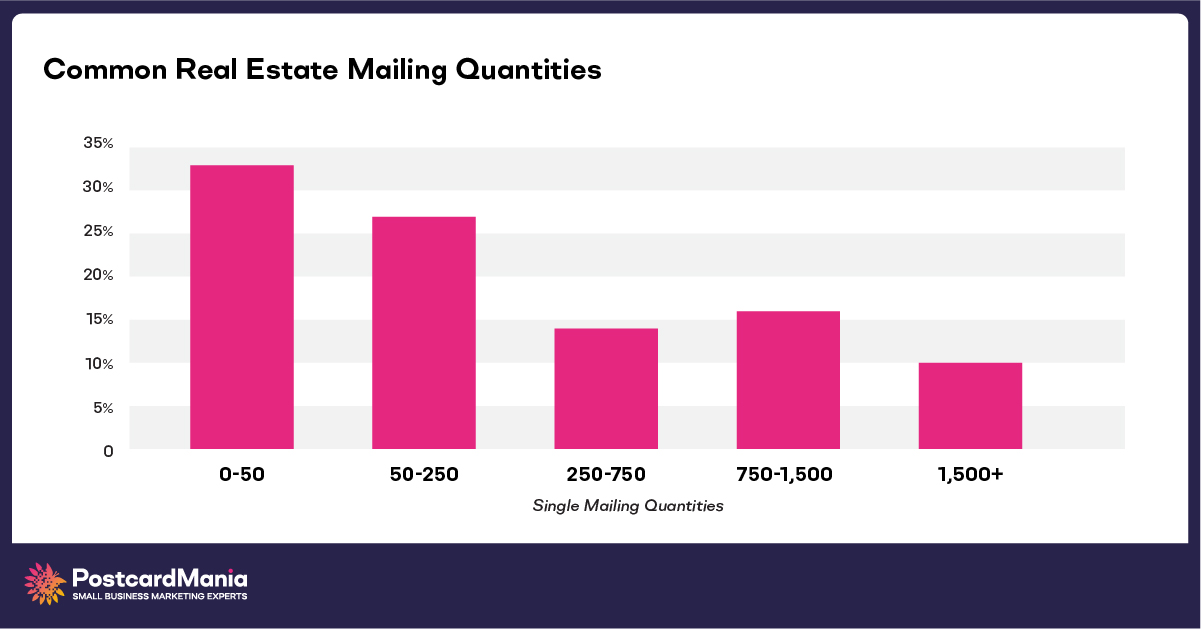
We looked at the quantity of every single real estate mailing we delivered in 2021 and found nearly 3 out of every 4 mailings was 500 pieces or less. This data shows that around 70% of our real estate agents mailed postcards in batches of 750 cards or less, whereas less than 1% mailed out 10,000 cards at a time.
Bear in mind that these numbers reflect mailing quantities rather than order quantities. Well-versed real estate professionals order in high-volume quantities to take advantage of discount printing and then schedule their mailings ahead of time to automate the process — saving them both time and money.
Among those mailing high volumes, most were seeking new listings, with a few exceptions for brokerages recruiting agents and those selling newly built properties.
Of course:
There are reasons why a real estate agent may want to mail in smaller or larger quantities.
For example: Carrie Chase, a client of ours, and her Coldwell Banker Preferred Properties team, chose to send out larger batches of postcards (between 1,000 and 7,500) to reach as many absentee lot owners as possible. The total amount of cards for their direct mail campaign was 22,500 postcards, and as a result, they heard back from over 2,000 lot owners and generated over $125,000 in revenue.
The biggest benefit of this strategy is that it’s possible to generate a massive response in a smaller timeframe. The key is preparing for it. If your team is not equipped to handle a large response at once, this may not be the strategy for you.
On the other end of the spectrum, a smaller mailing could help you narrow down your focus and hyper-target specific locations or individuals.
In the case of real estate agent David Newman, 3,000 postcards were mailed to a consumer mailing list of all the residents in a certain zip code. He received 2 listings, sold them both and generated $12,000.
Whichever mailing count you choose, based on your goals and resources, we can accommodate your needs. If you choose to mail out smaller quantities of postcards, we suggest using MyREpostcards, which is our easy-to-use platform where you can order, customize, and mail out real estate postcards within 48 hours.
Next, we looked at when the real estate industry mails the most.
Real estate agents mailed the most in spring, likely to gear up for summer moving season
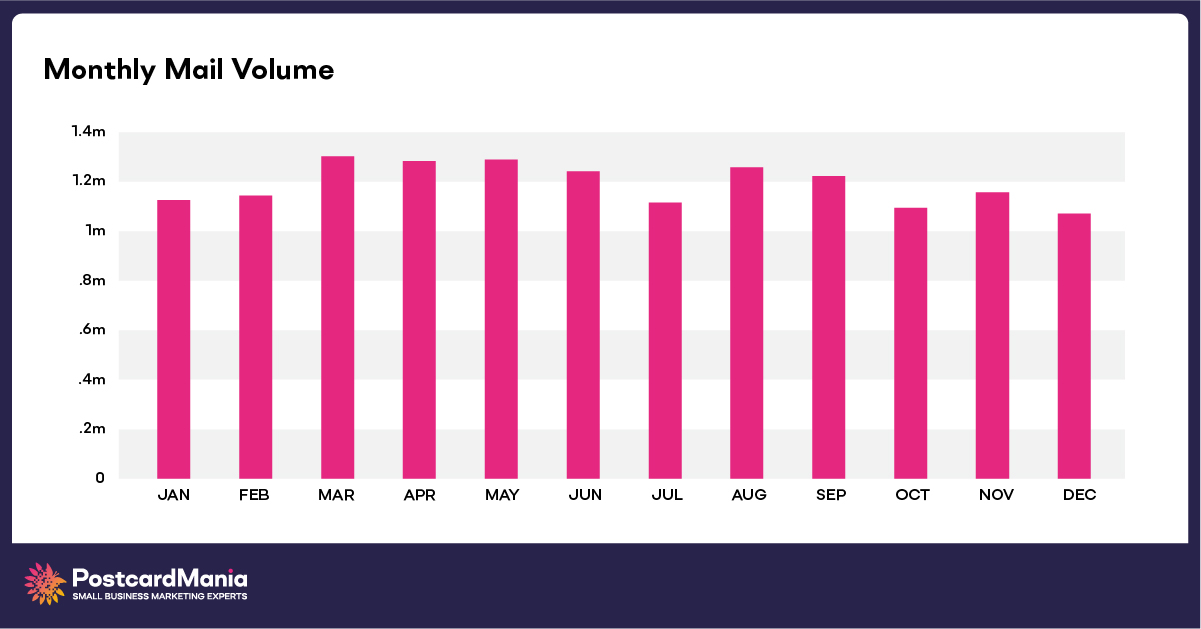
This graph is based on mail volume, which tallies the total amount of pieces mailed every month.
So, when are real estate agents mailing the most?
We looked at mail volume (as in the total number of pieces mailed per day) across the entire year to find the peaks and valleys.
Mailing patterns reveal that spring and fall are the most active mailing seasons for real estate, while the winter and summer months reflect a slowdown. The month with the highest mail volume was March, while December suffered the lowest mail volume month.
National averages follow a similar pattern…
For consumers, according to Zillow, historically, May used to be the best time to sell a home, but that has shifted to the month of March in recent years. If individuals are hoping to sell for more than the asking price, they should aim to list the week of April 22nd — or at least before September, because that’s when the school year starts. Homes listed in the weeks of October 14 and 21 were the least likely to sell above asking price.
Additionally, Bankrate reported this year that May is one of the best times to sell a home, as it nets a 13.4% seller premium based on home and condo sales over the past 10 years.
Of course:
Savvy real estate agents and brokers understand that a lot needs to happen in the months leading up to May if they want to ensure clients are cashing in on market-best prices.
That’s why you see so much mailing action starting in late winter and carrying on throughout summer.
So, when is the slowest time of year for real estate advertising?
Autumn is the slowest real estate mailing season both in terms of total mailings and mail volume
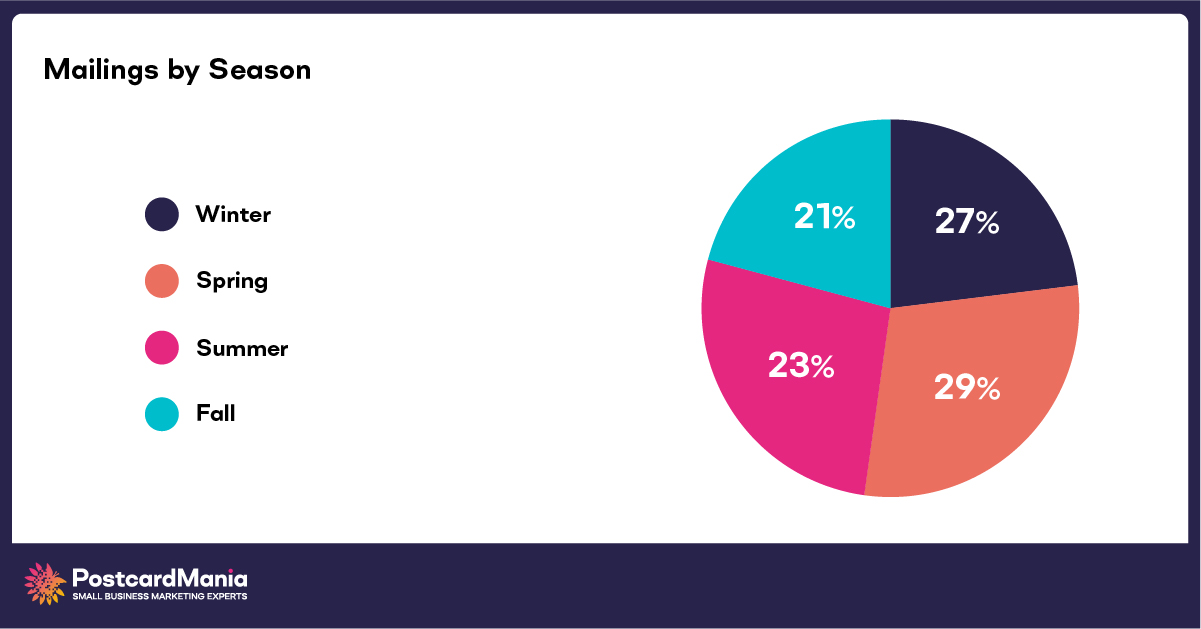
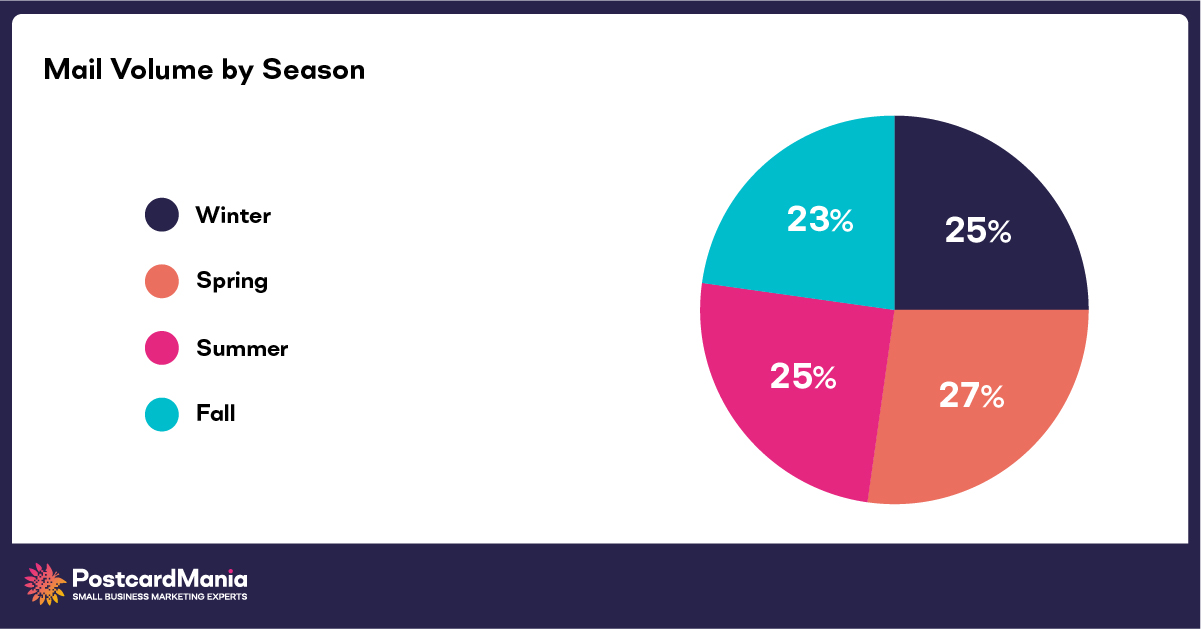
Autumn is a time for sweaters, pumpkin spice lattes, and just before the least desirable time to relocate — winter.
Real estate agents are smart, so they’ve caught onto this. Mailings are pretty quiet in fall compared to every other time of year.
Here’s how we divvied up the seasons:
- Winter: January, February, March
- Spring: April, May, June
- Summer: July, August September
- Autumn: October, November, December
Month with the most mailings: March
Month with the highest mail volume: April
The busiest season of the year was spring. The weather gets warmer, school ends, and sellers and buyers are more apt to start thinking about their plans for the summer and any big changes they want to make.
Very few people want to move during the holiday season, and real estate agents and brokers are clued into that fact.
Looking beyond the seasons…
Smaller mailing quantities fluctuate greatly throughout the year while larger mailing quantities stay consistent
We took an even closer look at mailing patterns per month based on the quantity of each mailing.
We wanted to know — did smaller mailings (those that were 50 pieces or fewer) follow a similar pattern? Did higher quantity mailings fluctuate more or less throughout the year?
We divided every mailing into a group based on its mailing quantity until each group included more than 2,500 mailings for the year.
What we discovered was that smaller mailings — those that consisted of 250 pieces or less — oscillated much more throughout the year, with a big drop off in July, November, and December.
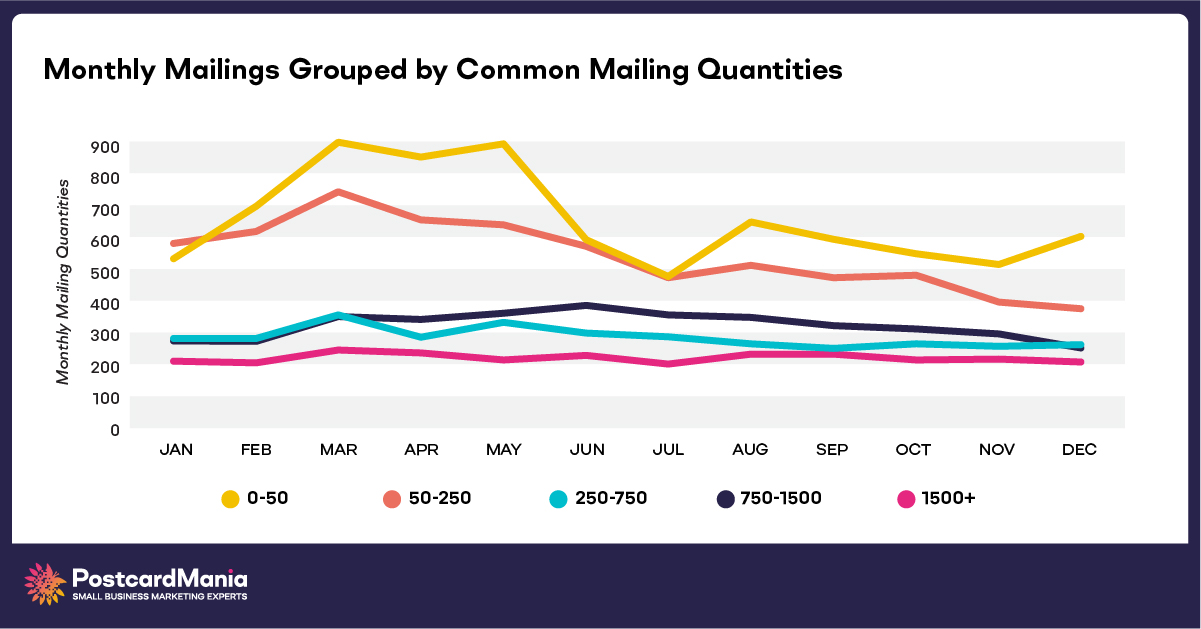
On the other hand, higher quantity mailings of 250+ pieces were much more consistent year-round.
It’s likely that the larger mailing quantities represent pre-planned farming campaigns, while the smaller quantity mailings may be triggered in response to consumer inquiries, such as visiting a website or converting online.
(Offline follow-up can be done without conversion thanks to services like Website to Mailbox, which automates individual mailings in response to online behavior, e.g. if someone visits your site and spends a certain amount of time browsing.)
Here’s where this might get interesting:
If the dramatic increase in small-quantity mailings in spring is driven by a response to consumer shopping habits, it’s worth noting that February and January — two of the lowest months for overall mail volume — may represent an under-served real estate marketing opportunity to reach consumers with moving on their mind in winter.
Next we looked at how real estate agents are mailing their postcards…
Real estate agents almost exclusively mail standard or first-class postage
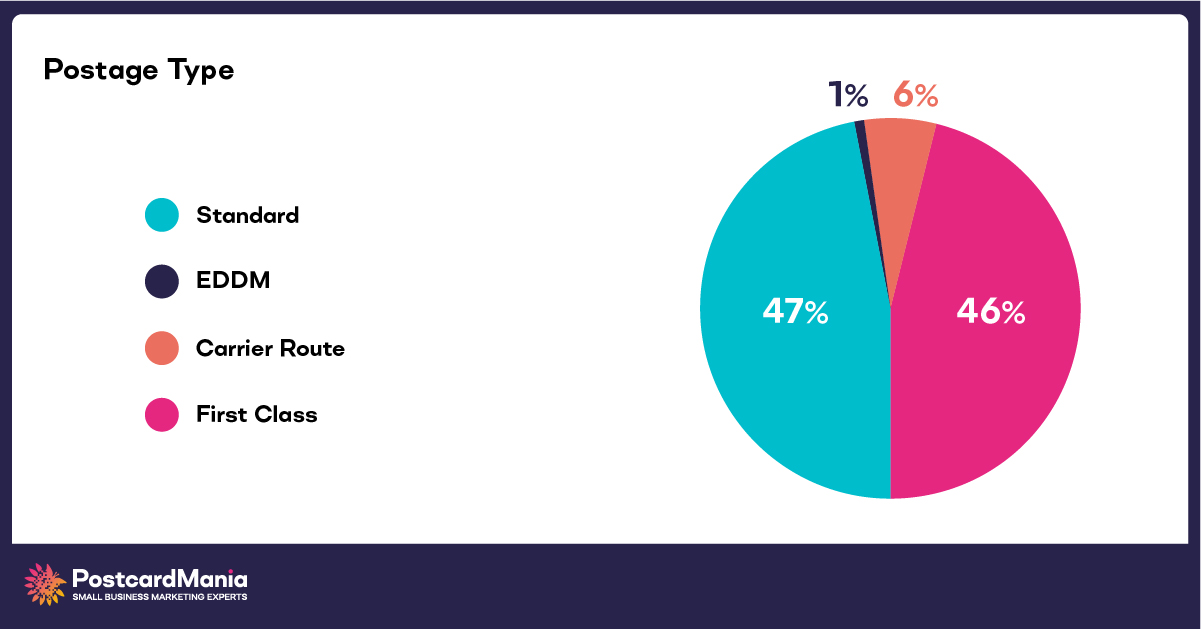
There are typically four different types of mail class/postage real estate agents utilize, each with its own advantages and disadvantages.
Standard postage: Standard postage is the more affordable tier of typical two-tiered letter-rate postage (as opposed to package rates). It can cost between $0.296 and $0.349 per piece.
- Pros: 30–74% cheaper than first class postage depending on mailing quantity and area saturation; allows for individual targeting based on household demographics regardless of mailing route
- Cons: No guaranteed delivery time; usually takes between 7–14 days but can take even longer during peak mailing seasons like the holidays
First-class postage: First-class postage is the pricier letter-rate tier. It can cost between $0.455 and $0.515 per piece.
- Pros: Faster than standard postage with guaranteed delivery 1–5 days from your mailing date (1–3 days locally and 3–5 days nationally); allows for individual targeting based on household demographics regardless of mailing route
- Cons: Costlier than standard postage
Carrier route postage: Sometimes referred to as a saturation mailing or resident/occupant mailing (res/occ), carrier route is a standard postage class that is discounted even further because its distribution is based on mail carrier routes — specific postal routes taken by USPS delivery staff. It can cost between $0.209 and $0.400 per piece.
- Pros: Up to 146% cheaper than first class postage and up to 70% cheaper than standard postage; good for saturating an entire area that you know is well qualified
- Cons: Limited demographic targeting options, no guaranteed delivery time; specific type of list required; usually takes between 7–14 days but can take even longer during peak mailing seasons like the holidays
Everywhere Direct Door Mailing or EDDM Postage: EDDM is a discounted carrier route mailing and the cheapest postage rate offered by the USPS apart from specialty postage rates, like those available to nonprofits. It can cost between $0.201 and $0.216 per piece.
- Pros: Up to 4% cheaper than carrier route postage; good for saturating an entire area that you know is well qualified; affordable larger mailing sizes available; DIY option available for those rich in time rather than money
- Cons: Limited demographic targeting options, no guaranteed delivery time; specific type of list required; usually takes between 7–14 days but can take even longer during peak mailing seasons like the holidays
Our data revealed that real estate agents rarely chose discounted mail classes like carrier route or EDDM, sticking with traditional standard and first-class postage 92% of the time.
This could be because the discounted postage classes require specific list types that real estate agents may not be using, opting instead to target individual households based on other criteria.
Once mailers are in the hands of the USPS, what’s the next marketing step?
The majority of our real estate clients opted not to purchase coordinated digital ads.
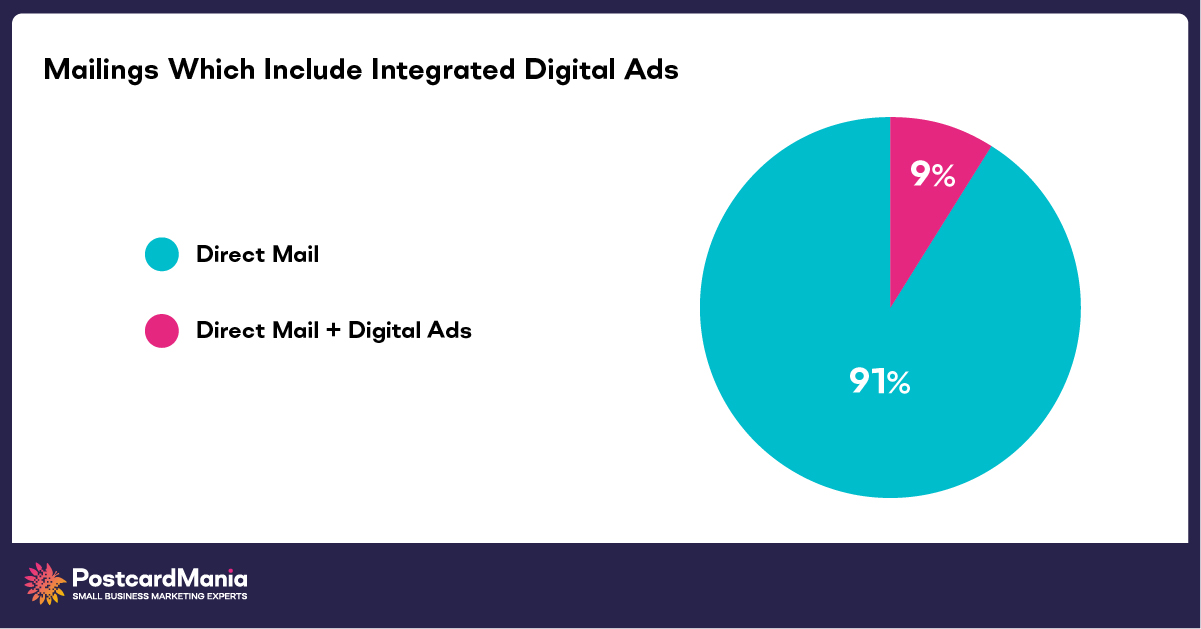
Surprisingly, only 9% of our real estate clients added digital marketing to their campaigns. This would include:
- Google and YouTube follow-up ads
- Facebook and Instagram follow-up ads
- Gmail ads
- Google Business Listing optimization
- Comprehensive mail and digital ad performance tracking
Are the other 90% of agents and brokers out there may be handling these ads themselves — or is there an opening in the digital real estate market for those looking to make some market gains? The data doesn’t quite reveal which may be more true.
Either way, combining a multi-channel approach that includes both direct mail and digital components is a must in today’s competitive market.
According to Canada Post, integrated direct mail and digital marketing campaigns elicit 39% more attention than single media campaigns.
Experts agree that multi-channel marketing campaigns perform better than single-channel campaigns — but what do the REAL campaigns run by real agents and brokers every day show?
Take Home Run Realty, based in Summerfield, FL, for example:
Real estate agent Elizabeth Izquierdo signed up for an Everywhere Small Business Platinum campaign that combines direct mail with digital ads. She mailed out 18,000 postcards in batches of 6,00 across 3 of the slowest mailing months: August to October.
Her mailings were accompanied by Google, Gmail, YouTube, Facebook, and Instagram ads that matched her postcard design.
The result?
She heard back from 6 people, listed 2 homes, and one of them sold for $500,000!
Elizabeth was so happy with how her campaign performed that she continued this strategy of combining direct mail with digital marketing and mailed out another 25,000 postcards.
Another story: a Re/Max real estate agent mailed only 2,865 postcards with Everywhere Small Business and gained one listing that earned him $66,000.
One more: a California-based broker only mailed 1,893 postcards with Everywhere Small Business before he gained a listing from that campaign that sold for $2.3 million.
We have many success stories like this in our full case study library if you would like to read more, or you can jump straight to our real estate case studies.
Many agents may be handling their online ads themselves, but help is out there for those craving a more streamlined approach.
Enter Everywhere Real Estate. It is one of our newest packages and brings together several powerful marketing elements to form a turn-key campaign that is specifically tailored for targeting home and property owners and driving up listings for you.
With Everywhere Real Estate, agents get:
- custom postcard design
- matching Google, Facebook/Instagram, and YouTube ads PLUS performance tracking + reporting
- call tracking, call recording, and caller demographics
- Google Street View images of any property added to individual postcards
- setting up or enhancing an already existing Google Business Profile
- and more — this page explains it all in detail
And our team of expert marketing consultants will give you unique advice — just for real estate agents and brokers — on what works best for them to increase their client lists.
But getting back to those 2021 mailings!
Next, we zoomed in a little to look at trends on a more local level…
Florida, California, and Texas were the busiest states for real estate mailings in 2021
No surprise here — America’s most populous states also made up our busiest real estate markets.
Here are the top 3 states based on number of mailings throughout the year:
Florida: # 1
California: #2
Texas: #3
And the top 3 states based on total mail volume throughout the year:
Florida: # 1
California: #2
Texas: #3
Not only do Florida, Texas, and California have the largest populations in the United States, they also have hot real estate markets. According to the USPS, Texas was the number-one state Americans moved to in 2021, closely followed by Florida. Texas grew by an estimated 310,288 residents between 2020 and 2021 while Florida gained 211,196 residents.
California, on the other hand, lost the most people as the USPS reported that more than 101,000 households moved out of the state — but of course, it still remains America’s most populous state (with America’s third most expensive housing market).
Wondering when mailboxes are fullest in your state? We’ve got you covered.
Scroll through to see which months boasted the highest real estate mail volumes in 2021 in every state, in alphabetical order:
| State | 1st | 2nd | 3rd |
|---|---|---|---|
| Alabama | January | May | September |
| Alaska | June | May | April |
| Arizona | March | February | January |
| Arkansas | December | July | August |
| California | June | August | April |
| Colorado | August | May | July |
| Connecticut | March | June | May |
| DC | April | July | May |
| Delaware | November | March | May |
| Florida | May | September | January |
| Georgia | August | February | November |
| Hawaii | June | April | July |
| Idaho | May | June | February |
| Illinois | July | June | May |
| Indiana | April | June | May |
| Iowa | June | January | February/March |
| Kansas | January | July | April |
| Kentucky | May | February | April |
| Louisiana | January | August | July |
| Maine | November | August | September |
| Maryland | September | August | May |
| Massachusetts | March | May | February |
| Michigan | March | June | April |
| Minnesota | November | March | January |
| Mississippi | May | July | June |
| Missouri | April | March | May |
| Montana | February | March | September |
| Nebraska | September | November | December |
| Nevada | October | March | April |
| New Hampshire | January | March | July |
| New Jersey | April | March | July |
| New Mexico | October | August | June |
| New York | December | October | September |
| North Carolina | April | May | August |
| North Dakota | June | July | August/September |
| Ohio | September | July | February |
| Oklahoma | April | January | March |
| Oregon | August | November | January |
| Pennsylvania | October | November | June |
| Rhode Island | June | May | August/September |
| South Carolina | March | November | May |
| South Dakota | March | October | November |
| Tennessee | April | July | June |
| Texas | August | April | February |
| Utah | January | June | August |
| Vermont | March | February | |
| Virginia | April | February | May |
| Washington | March | April | February |
| West Virginia | January | April | October |
| Wisconsin | August | January | March |
We also found that the most common month for mailing in every state was May, and the least common month for mailing in every state was December.
Hopefully this information is some help as you start to look toward the end of 2022 and your plans to make the best of 2023.
While we know that ensuring results from a marketing campaign is the top concern, there are other benefits of working with a marketing professional or agency. Hiring a professional saves time and resources, allowing real estate agents to give more attention to clients and home listings.
If you need more information on how to get started, call a PostcardMania marketing consultant FREE at 800-628-1804. They will be able to tailor a marketing strategy that fits your needs and your budget.


